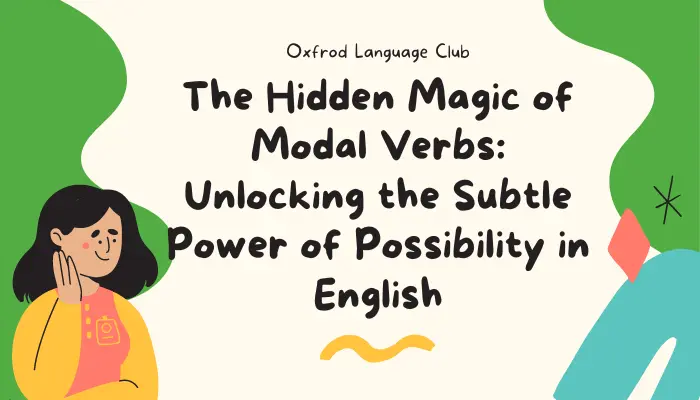Great site to keep my english skills updated for work and travel. I am really enjoying the lessons!
Maria C
 Argentina
Argentina


When we think about English grammar, we often focus on the basics—tenses, adjectives, or conditionals. But hidden within the structure of the language lies a subtle, powerful tool that can transform the way you communicate: modal verbs. These little words might seem simple at first glance, but they hold the key to expressing nuances, possibilities, and even the impossible.
What Are Modal Verbs?
Modal verbs are auxiliary verbs that express necessity, possibility, permission, or ability. The most common ones include can, could, may, might, must, shall, should, will, and would. Unlike regular verbs, modals don’t change their form based on the subject and are always followed by the base form of a verb.
The Power of Possibility
Modal verbs are not just about what is, but about what could be. Imagine you’re planning a trip. Saying, “I will go to Paris” is straightforward and clear. But what if the situation is uncertain? Here’s where modal verbs shine:
"I might go to Paris." This sentence introduces a world of possibilities. There’s a chance you’ll go, but it’s not set in stone.
"I could go to Paris." Here, you’re acknowledging the possibility exists—you have the means or opportunity—but it’s not a definite plan.
These subtle shifts in meaning allow you to convey a range of emotions and scenarios, from tentative plans to strong intentions.
Expressing Politeness and Indirectness
One of the most fascinating aspects of modal verbs is their ability to soften statements, making them more polite or less direct. Consider the difference between:
"Close the door." (Direct and possibly abrupt)
"Could you close the door?" (Polite and considerate)
The addition of “could” turns a command into a request, making your communication smoother and more nuanced.
Exploring the Realm of Hypotheticals
Modals are also crucial when diving into hypothetical situations, particularly with the word “would.” Imagine you’re daydreaming about an alternate reality:
"If I were rich, I would travel the world."
Here, “would” helps create a scenario that isn’t real but is fun to imagine. It’s a powerful way to discuss dreams, regrets, or alternate possibilities.
Mastering the Subtlety
To truly harness the magic of modal verbs, it’s essential to practice and experiment with them in different contexts. Try rephrasing your everyday statements using modals to explore how they change the tone or meaning. For instance:
"You must study." vs. "You should study."
"She can sing well." vs. "She might sing well."
Each pair of sentences carries a different weight, and learning to choose the right modal for the right situation can elevate your English from functional to expressive.
Modal verbs may not be as flashy as adjectives or as straightforward as tenses, but their power lies in their subtlety. They allow you to navigate the complex web of human thought and communication, expressing everything from uncertainty to politeness with just a few words. So, next time you’re crafting a sentence, don’t overlook these tiny but mighty verbs—they might just be the key to unlocking the full potential of your English expression.
August, 2024
Posted by Oxford Language Club